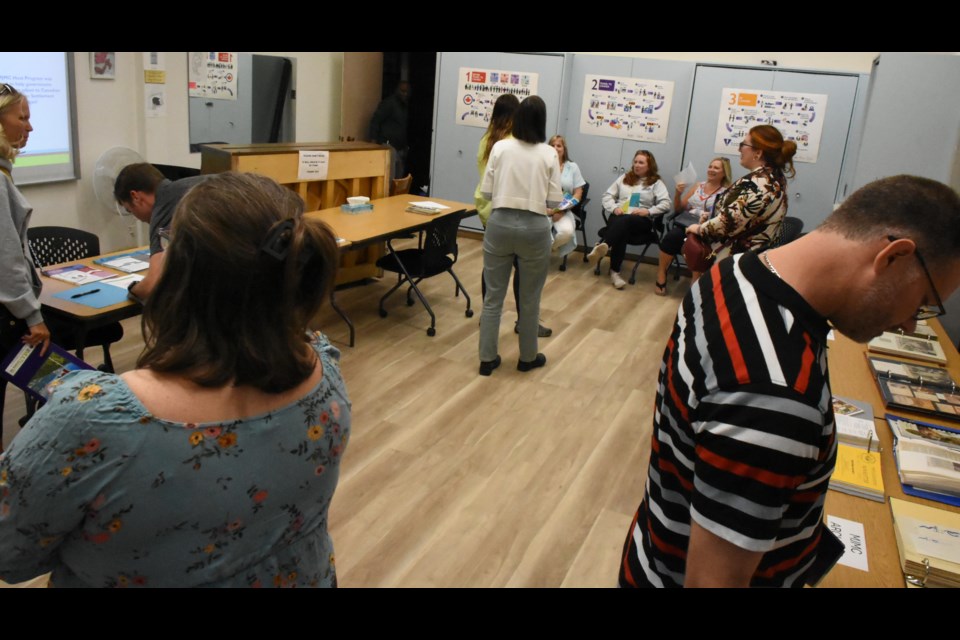MOOSE JAW — Nigerian-born Abdul Alabi required the services of the Moose Jaw Multicultural Council when he first moved here, and more than 10 years later, he is now an employee helping other newcomers integrate.
Alabi, the settlement advisor with the Newcomer Welcome Centre (NWC), the sister organization of the Multicultural Council (MJMC), studied and worked in Moose Jaw for several years before joining the centre two years ago.
“I’m not going to leave Moose Jaw — I love Moose Jaw,” he laughed on Sept. 24 while discussing the MJMC’s 50th anniversary.
“I saw an opportunity here and I said, ‘Wow, I want to be part of the organization.’ And we have been trying our best and people are very happy with the services,” he added.
Alabi was one of several employees giving tours of the MJMC’s venue at St. Andrew’s United Church to celebrate the council’s launch in 1974. He and Ginny McColl, the MJMC’s language program manager, spoke about the organization and the services it offers.
Generally, the MJMC focuses on providing language services while the NWC helps with employment issues.
McColl said it was a “huge achievement” to reach 50 years, while she thought it was great that the organization existed in a small community like Moose Jaw.
“We’re serving on a daily basis huge numbers (of immigrants). It speaks to Moose Jaw as a city … that is welcoming of newcomers … and even other migrants from other provinces and areas within Canada,” she continued.
The MJMC has changed over the years from being a small, grassroots organization to one that has adapted and grown to meet a growing immigrant population, McColl remarked.
Moose Jaw’s Canada Week Committee formed MJMC as a sub-committee in 1974 to help plan the Folkloric Festival that year. The festival — which later became Motif — was such a success that talks began to form a multicultural association, which led to the MJMC.
Its initial goal was to foster a more supportive environment for cultural groups participating in community events, while it also hoped to acquire a home venue. It eventually opened an office in Victory Church and remained there until 1999, when it moved to St. Andrew’s.
The agency is “very, very happy” and grateful that people attended the anniversary event, toured the venues and asked questions because they can learn what is happening with immigration services, said Alabi. Moreover, people could browse archival photos and articles about the MJMC.
The organization — including the NWC — employs people from various backgrounds, such as Nigeria and South Sudan, while staff can speak many languages like French and Arabic, Alabi pointed out. He can speak more than 50 languages because he grew up in a country with more than 120 different tongues.
MJMC’s main building supports permanent residents, federally assisted refugees, economic migrants and family classes, with many coming from the Democratic Republic of Congo, Afghanistan, Sudan and Syria, said McColl. It also supports federally funded Ukrainian refugees, although the province will start supporting them in March.
Meanwhile, the Newcomer Welcome Centre supports temporary foreign workers, permanent residents and international students.
The NWC has found that many immigrants — students and non-students — are impressed with Moose Jaw, while they are grateful for receiving help integrating, said Alabi. The centre offers advice on issues like acquiring a vehicle, housing and a family doctor.
He added that MJMC and NWC support clients within a 150-kilometre radius of Moose Jaw — similar to Prairie South School Division’s boundaries.
At the NWC office, manager Melissa Mitchell spoke about that organization’s services during a tour. The centre has been in operation since 2010 — it was established to support an influx of temporary foreign workers — while she has worked there in various roles for over 11 years.
She noted that the two biggest issues facing new immigrants include housing — especially for big families — and transportation, especially those who work evenings and weekends.
For more information, visit https://mjmcinc.ca.




